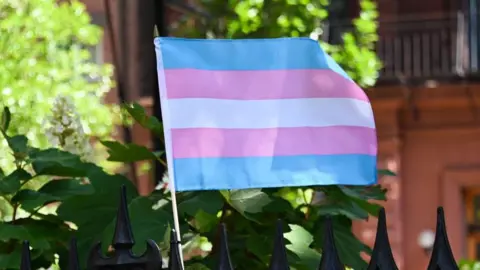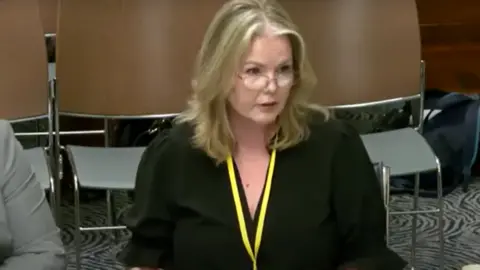Equality Commission to seek clarity on court gender ruling
 Getty Images
Getty ImagesThe Equality Commission will seek a declaration from the High Court to address "uncertainties" over how to apply the UK Supreme Court ruling on the legal definition of a woman in Northern Ireland.
The commission has published a paper giving its views on the legal position, following the ruling that a woman is defined by biological sex under equalities law.
The Supreme Court had been asked to decide on the proper interpretation of the 2010 Equality Act, which applies across Great Britain but not in Northern Ireland.
Chief Commissioner Geraldine McGahey said the situation was "much more nuanced and complicated" and there was "significant uncertainty due to our unique legal landscape".
The commission said it believed the ruling would be "highly persuasive" in the Northern Ireland courts and tribunals "in certain respects" - but it has concluded that "significant legal uncertainties" remain.
It said the Supreme Court ruling did not consider the Article 2 commitments under the Windsor Framework, which provide legal protections that certain equality and human rights in Northern Ireland are not reduced after Brexit.
The paper sets out a roadmap of the actions the commission will take to achieve legal certainty and includes information for employers, service providers and public authorities.
'Significant legal uncertainties'
Ms McGahey said that to achieve "greater long-term certainty and clarity", the commission would ask for a declaration from the courts "to address several questions regarding the significant legal uncertainties".
"Our equality laws do not sit in isolation; they interact with other laws and regulations for which the commission does not have a remit," she said.
"We believe other bodies and organisations will also require clarification on the legal position in relation to their own areas of work and may join the commission in its legal proceedings."
The commission will also issue pre-action protocol letters to government departments and public bodies affected by the judgment and begin a wider consultation process.
The commission said it would keep interim information about the judgment for employers and service providers under review and would offer advice on a case-by-case basis.
Ms McGahey said "maximising legal certainty and transparency" was important.
She said she wanted to avoid "the toxicity which has sometimes characterised the debate around how to balance the rights of biological women and transgender women by creating a space for debate and adjudication by the courts".
 NI Assembly
NI AssemblySpeaking to BBC Radio Ulster's Talkback programme, Kirsty Montgomery from Women's Rights Network NI said its membership was "very disappointed" with the Equality Commission's decision.
"We were really hoping that the Equality Commission guidance would give a lot more clarity to employers and service providers," she said.
"For women in Northern Ireland in particular, it puts us in a different position from women in the rest of GB.
"For all intents and purposes, we now have fewer protections because we are no further along and the Windsor Framework is supposed to protect women's rights so we were really disappointed."

Alexa Moore from the Rainbow Project said said it was "difficult to draw any concrete solutions" about how the Supreme Court judgement applied in Northern Ireland.
Ms Moore said she "welcomed that the Equality Commission has recognised that" Article 2 of the Windsor Framework provided some protections.
"I think it will be useful to get clarity but the reality is that we don't want to see any regression of the rights of trans people, whether that comes through the courts, through legislation, through the Supreme Court judgement," Ms Moore said.
